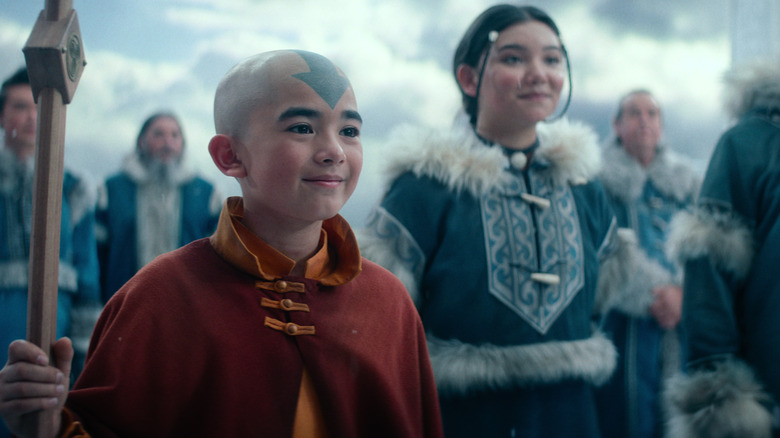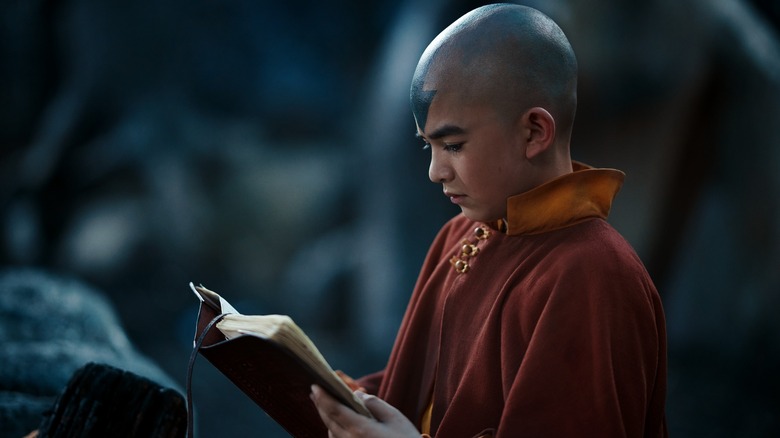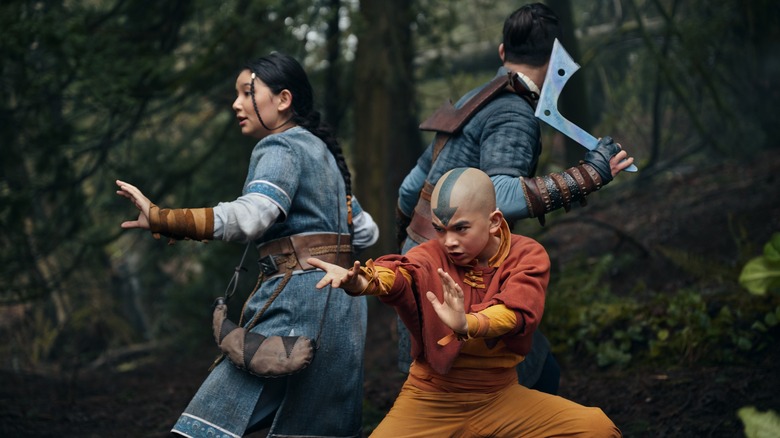The Huge Avatar: The Last Airbender Storyline Netflix Completely Skips
Each season of the original "Avatar: The Last Airbender" has a name referencing both the nation at the center of that season's story and the element Aang (Zach Tyler Eisen) is learning: "Book One: Water," "Book Two: Earth," and "Book Three: Fire." But Netflix doesn't use them for its live-action adaptation. And that's perhaps because Aang (Gordon Cormier) doesn't conjure a single bit of waterbending outside of the Avatar State throughout the eight episodes of Season 1 — not even in some brief closing shot in the finale.
Katara (Kiawentiio) occasionally studies from a scroll given to her by the otherwise ruined character Gran Gran (Casey Camp-Horinek), but she never even shows it to Aang, nor does he practice with Master Pakku (A Martinez). This is a truly baffling choice given that the entire animated series is about growth, learning from different sources, and slowly developing mastery. Not only does it cheapen the magic of bending, but it also removes a central piece of Aang's character arc, without which he often feels aimless and devoid of internal drive.
Netflix changes Aang's whole motivation
On the original "Avatar: The Last Airbender," it's explicitly stated that Aang must learn the elements in the same order as the reincarnation cycle: first air, then water, then earth, and then fire. So he begins his journey by traveling to the Northern Water Tribe to seek out a waterbending master. Of course, that's just one of the storylines that Netflix's "Avatar: The Last Airbender" shouldn't have cut but did. Instead, Aang's motivation is the result of a vision that Avatar Kyoshi (Yvonne Chapman) gives him in Episode 2 in which he sees the Northern Water Tribe under attack by the Fire Nation. And by the time he finally arrives, the Fire Navy is so close that there's little time for any actual waterbending training even if he had wanted to.
While visions are also present throughout the original series — for example, Aang has a vision of Toph Beifong (Michaela Jill Murphy), whom he has yet to meet, while trapped in the Foggy Swamp in Season 2 — they're never used this explicitly. There's a big difference between having a vague vision in a Spirit Wild and seeing the future exactly as it will come to pass. Regardless of any changes necessitated by the switch to live action, this just feels like lazier writing, and it's a change to the lore that didn't need to happen. Aang's original motivation of needing to learn waterbending would have worked just fine to get Team Avatar to the Northern Water Tribe, but it seems that wasn't dramatic enough for a prestige streaming series.
How Netflix's Avatar cheapens the power of bending
Aang isn't the only one affected by Netflix cheapening the importance of bending training — it hurts Katara's arc as well. The animated series makes it clear that teachers are often wrong, that there are many ways to learn, and that strict tradition isn't always the answer. At the same time, it emphasizes that when it comes to martial arts and spiritual discipline, constant practice and learning from masters are crucial. There's a balance to be struck between the two ideas.
On the other hand, while the Netflix series re-creates Katara's arc of standing up to Pakku's sexist prejudices well, it gets a little too caught up in girlbossing her. For example, when she faces Prince Zuko (Dallas Liu) during the Siege of the North, he drops one of his famous lines from the cartoon: "You little peasant! You found a master, haven't you?" New for the live-action series, she responds cheekily, "Yes. You're looking at her."
Later, Pakku tells Katara that Aang couldn't have asked for a better master. These lines are meant to be rah-rah moments showcasing her immense strength, but without a single instance of instruction for either her or Aang, they fall flat. Character accomplishments need to be balanced with the themes of discipline and growth — ideas that are central to the real-world martial arts from which "Avatar" draws inspiration. The Netflix adaptation seems to forget that, and it's worse for it.


